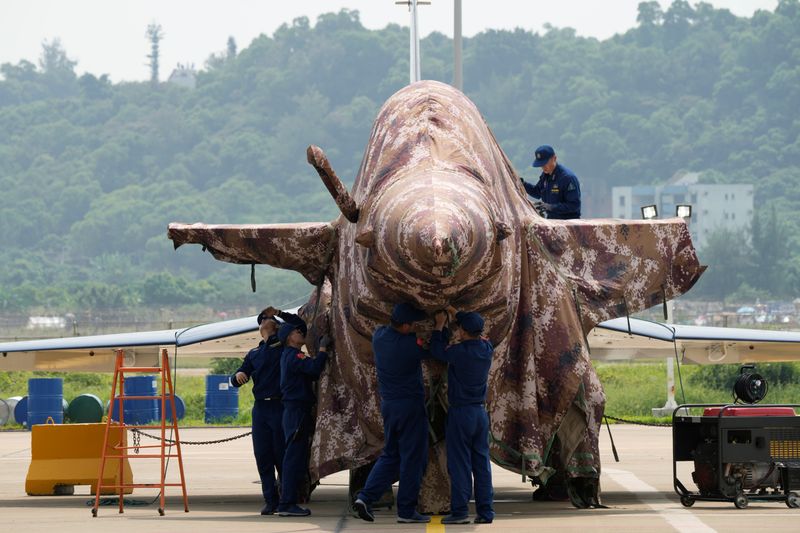By Yew Lun Tian
BEIJING (Reuters) -China will boost defence spending by 7.2% this year, slightly outpacing last year's increase and faster than the government's modest economic growth forecast, as Premier Li Keqiang called for the armed forces to boost combat preparedness.
The national budget released on Sunday showed 1.55 trillion yuan ($224 billion) allocated to military spending.
The defence budget will be closely watched by China's neighbours and the United States, who are concerned by Beijing's strategic intentions and development of its military, especially as tensions have spiked in recent years over Taiwan.
In his work report to the annual session of parliament, Li said military operations, capacity building and combat preparedness should be "well-coordinated in fulfilling major tasks".
"Our armed forces, with a focus on the goals for the centenary of the People's Liberation Army in 2027, should work to carry out military operations, boost combat preparedness and enhance military capabilities," he said in the state-of-the-nation address to the largely rubber-stamp legislature.
This year's hike in defence spending marks the eighth consecutive single-digit increase. As in previous years, no breakdown of the spending was given, only the overall amount and the rate of increase.
The spending increase outpaces targeted economic growth of around 5%, which is slightly below last year's target as the world's second-largest economy faces domestic headwinds.
Beijing is nervous about challenges on fronts ranging from Chinese-claimed Taiwan to U.S. naval and air missions in the disputed South China Sea near Chinese-occupied islands.
China staged war games near Taiwan last August to express anger at the visit to Taipei of then-U.S. House Speaker Nancy Pelosi.
Li Mingjiang, associate professor at S. Rajaratnam School of International Studies in Singapore, said defence spending outpacing the economic growth forecast showed China anticipates facing greater pressures in its external security environment, especially from the United States and on the Taiwan issue.
"Chinese leaders are clearly intensifying efforts to prepare the country militarily to meet all potential security challenges, including unexpected situations," he said.
China, with the world's largest military in terms of personnel, is busy adding a slew of new hardware, including aircraft carriers and stealth fighters.
'STRENGTHEN MILITARY WORK'
Beijing says its military spending for defensive purposes is a comparatively low percentage of its GDP and that critics want to demonise it as a threat to world peace.
"The armed forces should intensify military training and preparedness across the board, develop new military strategic guidance, devote greater energy to training under combat conditions and make well-coordinated efforts to strengthen military work in all directions and domains," Premier Li said.
Takashi Kawakami, a professor of Takushoku University in Tokyo, said China would probably give priority to its nuclear capability.
"As China strengthens the new area of cognitive warfare over Taiwan, I think it will also use the budget to build up its cyber and space capabilities, as well as its submarine forces to target undersea cables," he said.
China's reported defence budget in 2023 is around one quarter of proposed U.S. spending, though many diplomats and foreign experts believe Beijing under-reports the real number.
The fiscal 2023 U.S. defence budget authorises $858 billion in military spending and includes funding for purchases of weapons, ships and aircraft, and support for Taiwan and for Ukraine as it fights an invasion by Russia.
China has long argued that it needs to close the gap with the United States. China, for example, has three aircraft carriers, compared with 11 in active service for the United States.
The Ukraine war has prompted some elements in China's military-industrial complex to call for an increase in the defence budget.
An article published last October in the official journal of the State Administration of Science, Technology and Industry for National Defence, a central government ministry responsible for wartime logistics, recommended an increase in the military budget given surges in defence spending from NATO member-states besides the United States.

"This matter is not about participating in the international arms race, but defending our national security," it said.
($1 = 6.9048 Chinese yuan renminbi)